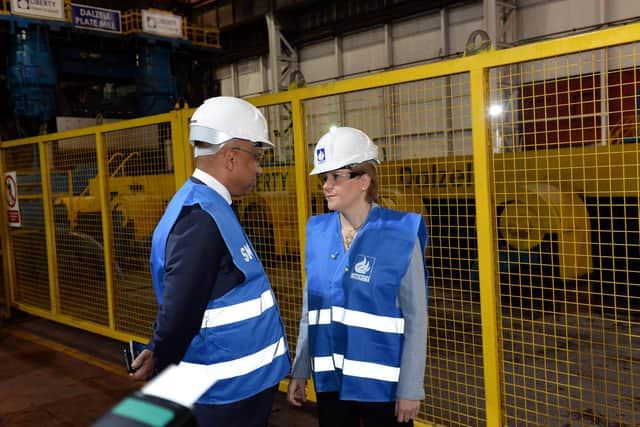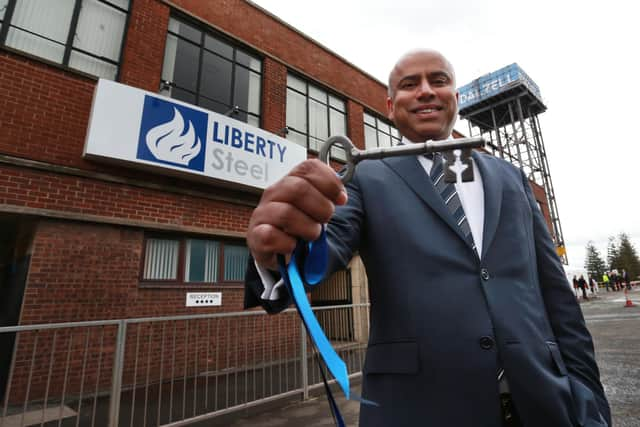Insight: Greensill collapse raises questions over Scottish Government's steel deals
The example it cited to prospective clients as one of its “most innovative deals” was close to home.
“Take a hydropower plant in the foothills of Ben Nevis, add a struggling nearby aluminium smelter and mix in a good dose of Scottish Government support,” the pamphlet teased.
Advertisement
Hide AdAdvertisement
Hide AdThe formula involving Sanjeev Gupta’s GFG conglomerate, according to Greensill, was proof that its supply chain finance blueprint, also known as reverse factoring in finance circles, was a good fit – even when it came to complex, long-term projects.
In layman’s terms, it spelled out how Greensill had forecast the receivables for electricity produced at GFG’s Lochaber hydroelectric plant over a 25-year period.
The crunch sentence came next. “The promise of those funds due to be paid,” it explained, “was used to finance the purchase by GFG of the plant and the smelter it powered.”
It added: “The Scottish Government guaranteed the electricity payments which assured the Greensill structure received a sovereign rating, making the receivables even more attractive to investors.”
If it all sounded too good to be true, we are beginning to understand why.


Three years on, the ignominious collapse of Greensill is sending shockwaves around the world.
A firm valued at several billion pounds less than two years ago has filed for bankruptcy after Credit Suisse pulled the plug on £7.2 billion of investment funds, and Tokio Marine, a Japanese insurance firm, pulled its cover for the firm.
The supply chain finance system Greensill championed as an innovative and efficient lending model is now coming under fierce scrutiny, with echoes of the sub-prime mortgage crisis that contributed to the 2008 global financial crisis.
Advertisement
Hide AdAdvertisement
Hide AdThe long-term repercussions of Greensill’s demise remain unclear.


The growing scandal around former prime minister David Cameron’s attempts to lobby UK Government ministers on behalf of the company means that the Conservatives will likely face the greatest political damage.
But it is Scotland that could well bear the economic brunt of Greensill’s sudden drop to earth, posing a major headache for the next Holyrood administration.
‘Vital industries, jobs and public finances in Scotland could be at risk’
GFG, the firm cited in Greensill’s 2018 pamphlet, was its biggest client by far, with credit facilities running to several billion pounds. Gupta, 49, is attempting to refinance the business after what he described as “the most difficult month of my life”, but the challenge he faces is acute.


If he fails, Scottish taxpayers could pay a hefty price. Under the terms of that dea,l which saw GFG buy the Lochaber plant in December 2016, the Scottish Government made a 25-year-long guarantee to buy power it generated in the event the smelter shut down.
Even at a conservative estimate, the total bill to the public purse could be in the region of £575 million.
Ministers deemed such a guarantee crucial to facilitating GFG’s £330m purchase of the plant from Rio Tinto, viewing it as a necessary obligation in order to protect rural jobs, and create critical mass for a sustainable steel production sector.
But the precariousness of the arrangement was, and continues to be, keenly felt by those in government.
Advertisement
Hide AdAdvertisement
Hide AdA summary of an August 2017 meeting between First Minister Nicola Sturgeon, Fergus Ewing, cabinet secretary for the rural economy, and Mary McAllan, the government’s director of economic development, warned that the government had “reached the very limits of what was possible”.
The briefing, released under Freedom of Information legislation, also noted “the potential to be overexposed to one company – a company that we know is on an aggressive expansion drive elsewhere”.
Now, Scotland on Sunday has learned that the previous month, the Scottish Government hired Deloitte to provide expert independent financial advice in relation to the various conditions, undertakings and monitoring requirements of the guarantee and reimbursement agreement between it and GFG’s Lochaber subsidiary.
The purpose of the advice, according to government documents, was to ascertain the “ongoing financial stability” of the firm, and ensure the government received “timely notification of key risks” so that it could make effective decisions about its guarantee exposure.
If at first sight, the hiring of Deloitte appeared to be prudent bookkeeping on the part of ministers, it seems anomalous given that only the year before, they had hired EY, another of the Big Four accountancy firms, to scrutinise the proposed deal with Gupta.
EY’s due diligence – known as Project Golf – was completed in November 2016. While a full copy of the 118-page report has been released into the public domain, the extent of the redactions render it virtually unintelligible.
What is clear is that by enlisting Deloitte, the government had unanswered questions about its quarter-century-long deal with GFG. Indeed, it still does.
While the initial contract with Deloitte ran out in the summer of 2018, the government hired the firm again the following year to provide further advice. That deal is set to continue until September at the earliest, at a cost of around £200,000 to taxpayers.
Advertisement
Hide AdAdvertisement
Hide AdThe precise details of the guarantee remain unknown, with the government stating that it cannot disclose its total gross liability due to commercial confidentiality.
But one 2018 briefing prepared for a government minister, and released via Freedom of Information, gives an idea of at least one of the terms.
It states that an “outstanding point” arising from the guarantee was GFG’s commitment to enter into a “significant community land transaction”. No such transfer has ever been agreed.
While the guarantee was approved by Holyrood’s finance and constitution committee, misgivings were expressed. At the meeting between Sturgeon and Ewing, parliamentary support for the deal was characterised as a “close run” thing.
The government has not revealed the advice it has received from Deloitte, but Monica Lennon, Scottish Labour’s economy spokeswoman, told Scotland on Sunday there was a need for “full transparency”.
She said: “If SNP ministers failed to act on warnings from Deloitte and others, that would be a huge dereliction of duty. Vital industries, jobs and public finances in Scotland could be at risk.”
Willie Rennie, leader of the Scottish Liberal Democrats, said “Instead of 2,000 new jobs, the reward for the Scottish taxpayer has been a succession of big bills from assorted accounting firms, and a government that finds itself on the hook to the tune of £500m.”
Falling staff levels and shelved expansion plans
Unorthodoxy is a defining characteristic of the Scottish Government’s four year-long relationship with GFG and Gupta, a former commodities trader whose dizzying rise earned him the sobriquet ‘man of steel’.
Advertisement
Hide AdAdvertisement
Hide AdThe association began with much fanfare with the rescue of the Dalzell steel plate mill in Motherwell and the nearby Clydebridge steel plant in Cambuslang. Ministers bought the mothballed sites directly from Tata Steel, before selling them on to Liberty Steel, another GFG subsidiary.
That unusual ‘back-to-back’ agreement saw the government praised for its swift, interventionist approach, and when Sturgeon attended a ceremonial handover of the plants in April 2016, she declared it as a “new era for Scottish steel”.
But the mechanism used for the buyout, and the speed at which it was conducted, raised concerns that insufficient time had been spent looking through the numbers and business plan put forward by GFG and Liberty. The risk of that transaction is no longer theoretical.
On March 31, 2017, Scottish Enterprise approved a £7m loan to Liberty Steel Dalzell Ltd – another of the 85 UK companies in which Gupta is a director.
The loan, which came on top of £1.97m in grant support, was issued on a commercial basis and was to be repaid within three years. However, filings at Companies House show the £7m remains outstanding.
A spokeswoman for Scottish Enterprise confirmed it was in discussions with Liberty Steel on repayment of the loan, and to “explore avenues of support” for a business that had a “significant economic benefit”. She added: “Debt forbearance is not uncommon in the current market.”
But Lennon warned: “GFG has effectively defaulted on a £7m Scottish Enterprise loan and there’s a real danger that Scottish public finances have been overexposed to this firm.”
While GFG’s firms are still viewed as key economic assets, questions remain about the promises made by Gupta. His firm hoped to employ as many as 200 people at the Dalzell plant by early 2018, but the headcount has never reached that figure.
Advertisement
Hide AdAdvertisement
Hide AdIndeed, the number of staff across production, sales and administration has fallen, according to the subsidiary’s most recent annual accounts, down from 190 in 2018 to 172 in 2019. A source said more than a dozen staff left the firm via voluntary redundancies in the first two years of GFG’s ownership. It is understood the number of employees has since shrunk further to around 140.
A similar picture has emerged in Lochaber. After striking its deal to buy Britain’s last remaining aluminium smelter – and hosting a bash at the Isle of Eriska Hotel on Oban to celebrate, where the guests included John Swinney and Ewing – Liberty promised to not only protect the existing 170 jobs, but expand metal manufacturing and downstream engineering to create up to 2,000 direct and supply-chain jobs in the Highlands.
Yet the latest accounts for the smelter firm show it has only 104 staff, while a nearby GFG subsidiary, SIMEC Lochaber Hydropower 2 Limited, has seen its employee numbers shrink to just 93.
But by far the greatest blow to the government’s investment in Gupta’s empire has been his failure to make good a promise to build a £120m alloy wheel factory at the Lochaber site – a facility that would create 400 jobs and prove capable of supplying at least one fifth of all wheels required by UK vehicle makers.
Though the plans were greenlit by Highland Council in November 2017, they have since been shelved, with GFG blaming a downturn in car manufacturing and Brexit.
The firm has since changed tack, and has announced ambitions for an on-site aluminium recycling facility to produce billets for the construction industry, but for the moment, they remain just that.
In the meantime, the enthusiasm with which senior public figures welcomed GFG to the north of Scotland now looks distinctly hyperbolic. Fergus Ewing had declared in March 2017 the firm would add around £1bn to the local economy over the next decade and spark an “economic revival” across Highland communities.
There is still time for the cabinet secretary for the rural economy to be proven right, but the collapse of Greensill means the odds are stacked against him.
Advertisement
Hide AdAdvertisement
Hide AdA spokesman for GFG told Scotland on Sunday the Lochaber smelter was a “profitable operation,” with £15m invested to date on its expansion plans, and said the Dalzell plant was “operationally strong this year” and up to date with its vendor payments.
He added: “GFG has made significant long-term investments to rescue steel and aluminium plants saving thousands of jobs in industrial communities that would have otherwise been lost.
“GFG has already invested £500m in Scotland since entering the country in 2016.”
The company did not address questions around whether it planned to seek further financial assistance from the Scottish Government to secure the future of its businesses.
‘There needs to be full disclosure’
Were the worst-case scenario to come to pass, and GFG was no longer able to maintain its steel operations in Scotland and further afield, the consequences could be seismic. The firm’s failure to refinance could not just put hundreds of jobs in Scotland at risk, but around 3,000 across the UK, and impact on supply chains for sectors including defence and aerospace.
Just days before Parliament broke up for the pre-election period, Ewing told Holyrood that he had spoken with Gupta, who emphasised the “underlying operational health” of GFG’s Scottish operations. Ewing said the government was “mitigating risks as far as we can.”
But Murdo Fraser, the Scottish Conservative finance spokesman, told Scotland on Sunday there was an urgent need for details on the government’s potential exposure.
“There needs to be full disclosure from the Scottish Government in terms of all its dealings with Sanjeev Gupta and the GFG group, but also regarding what all this means for the jobs in Lanarkshire and Fort William, and the exposure to the Scottish taxpayer because of the public funds that have been potentially put at risk,” he said.
Advertisement
Hide AdAdvertisement
Hide Ad“We need much more clarity than we have had so far. The statement Fergus Ewing gave to Parliament was very light on detail, and there is a whole range of questions that have yet to be answered.”
One theory is the government would have a degree of leeway if GFG goes to the wall. The Lochaber guarantee could be recovered, in part at least, by the sale of electricity to the grid, and ministers have put in place a range of securities against GFG’s assets, including the smelter and hydroelectric station.
Even so, questions over how the government could have made such a significant investment in a firm so reliant in Greensill are mounting.
It is not clear if ministers, whether under their own steam, or via the advice they paid for from EY and Deloitte, were fully aware of GFG’s reliance on the company for financing. One thing is certain; they had ample opportunity to find out in person.
Ewing has been widely criticised this past week after it emerged he dined with Gupta and Lex Greensill the founder of the eponymous finance firm, at Glasgow’s Cail Bruich restaurant in June 2017. But it was far from the only meeting between senior Scottish Government figures and GFG executives.
GFG’s meetings with Sturgeon, Swinney, and others
Records maintained in the Scottish Lobbying Register and by the government show that between March 2018 and the following July, GFG executives met with at least seven government ministers across nine occasions.
Ewing was present at two of them, including a two-and-a-half hour long dinner in May 2018 with several GFG officials at Contini, the upmarket Italian restaurant on Edinburgh’s George Street.
Those representing Gupta’s firm included Jay Hambro, its chief investment officer, and Duncan Mackison, chief executive of Jahama Highland Estates, the sprawling 114,000 acre landholding Gupta acquired as part of GFG’s Lochaber deal – turning the Indian-born businessman into an instant laird, as well as the fifth largest private landowner in the UK.
Advertisement
Hide AdAdvertisement
Hide AdAccording to the entry in the register, the group discussed the possibility of upsizing the projected output of GFG’s never-to-be-built alloy wheel factory from two million wheels a year to three million. As with Ewing’s 2017 dinner, the government said it has no notes about the dinner and no information about who paid for it.
The government’s own record of ministerial engagements shows that Sturgeon met with Gupta in March 2018.
It is understood the meeting, at Holyrood, lasted for around three quarters of an hour.
A briefing prepared for the First Minister stated that if the government was contemplating further significant financial support to GFG, it would “continue to act in a manner that avoids the impression or actual risk of over exposure to one prominent company or group of companies”.
Others who met with GFG over the period include deputy first minister John Swinney, Keith Brown, cabinet secretary for the economy, Ivan McKee, the trade minister, and business minister Jamie Hepburn.
While the intense lobbying has stopped, the ties between GFG and senior government figures remain. In November, Kate Forbes, the finance secretary, attended the opening of its inaugural food retail outlet in Fort William, posing for pictures while holding a pack of raw venison burgers.
Lennon said the extent of the meetings between ministers and GFG meant there were questions over whether the government did enough to scrutinise the firm.
“We need the SNP to be open and upfront because the full impact of the close relationship between Greensill and GFG on Scotland is still an unknown quantity,” she said.
Advertisement
Hide AdAdvertisement
Hide Ad“We know about private dinners between SNP ministers and key GFG and Greensill figures, but not enough about what government business was actually discussed.
“The Scottish public have a right to know that appropriate checks were made on these companies. Dining out in fancy restaurants is not the same as forensic due diligence.”
Rennie said: “This scandal has exposed that it is not just the preserve of former Conservative prime ministers, but Bute House is mired in it too.
"The future of Scottish business should belong to firms who create high wage, highly skilled jobs in the green economy, not whoever can get a dinner reservation with a Scottish Government minister.”
A spokesman for the SNP said: "All of the Scottish Government's dealings with GFG have been focused entirely on saving jobs and promoting economic development in Scotland – unlike the Tories, whose dealings with Greensill have them mired in a cesspit of Westminster sleaze which they simply cannot run away from.
"Scottish ministers continue to monitor the situation closely, engaging with the business, with local management and with trade unions.
"As we have already said, we will do everything in our power to assist the steel and aluminium businesses and support their highly-skilled workers.
“We make no apology for that, nor for intervening previously to ensure the continued operation of the Dalzell works and the Lochaber smelter – the only remaining aluminium plant in the UK."
A message from the editor:
Thank you for reading this article. We're more reliant on your support than ever as the shift in consumer habits brought about by coronavirus impacts our advertisers. If you haven't already, please consider supporting our trusted, fact-checked journalism by taking out a digital subscription.
Comments
Want to join the conversation? Please or to comment on this article.